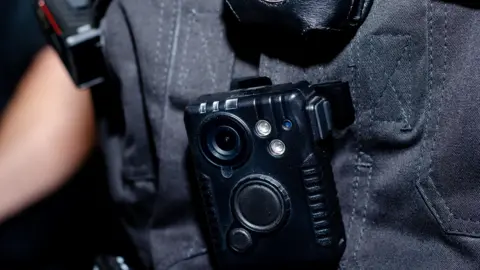Officers watched body-worn footage for 'entertainment'
 Getty Images
Getty ImagesMore than 70 Police Service of Northern Ireland (PSNI) officers watched body-worn video footage of a drugs arrest for their “entertainment and amusement”, an investigation has found.
The footage was accessed largely “without legitimate purpose” at 20 police stations on 248 occasions between 2019 and 2022, including one officer who watched it 21 times.
The Police Ombudsman's Office said “management action” had been taken against 74 officers, which is designed to improve their conduct.
The PSNI said it accepted three of the recommendations made by the Police Ombudsman and that it had introduced additional safeguards around body-worn video.
Another officer is the subject of an ongoing investigation into potential criminality in relation to accessing the material.
The footage showed a person being arrested for possession of illegal drugs.
'Lack of awareness'
During the incident, the arresting officer made an error administering a criminal caution, “causing a colleague to laugh in the background”.
Chief executive of the Police Ombudsman’s Office, Hugh Hume, said: “The video may have been viewed for entertainment and amusement, but the officers who did so showed little regard for the privacy of the man being arrested, nor for the emotional wellbeing of their colleague featured in the video.”
The issue emerged during a separate investigation.
“The responses received from officers, when asked to provide their reasons for accessing the video, suggested an apparent lack of awareness that doing so might constitute a criminal or misconduct offence," Mr Hume said.
“A number of officers indicated in their responses that as a result of the investigation they had refreshed their knowledge of PSNI guidance regarding body-worn video, which I welcome.”
Mr Hume said it was "imperative" that body-worn footage "should only be accessed for lawful policing purposes".
"Police use body-worn video to gain first accounts from victims that they meet. They use it to record their interactions with the most vulnerable people in our society."
'Significant residual risk'
He said the “management action” approach was “a reasonable and proportionate outcome”.
The PSNI accepted a number of recommendations designed to address misuse of body-worn video.
However, it rejected a suggested dip-sampling exercise - a random review - “to evaluate the scale of unauthorised access to the body-worn video system”.
The PSNI said it had introduced dip sampling by line managers as well as independent scrutiny via our newly established Service Accountability Panel which it was satisfied "achieved the same end result".
“Given the weaknesses in the control of access to body-worn video, it is our view there remains a significant residual risk that private and personal data can be accessed without a legitimate policing purpose," Mr Hume said.
He added that the ombudsman’s findings had been shared with the Information Commissioner’s Office.
'Disappointing breach of trust'
Speaking to BBC Radio Ulster's Good Morning Ulster programme, former PSNI officer Jon Burrows said it was "disappointing that the police officers have breached the trust that they have".
"It is unacceptable because police officers are trusted with really sensitive and sometimes very distressing and personal information from victims of crime," he said.
"The public need to know that the police service will treat that respectfully and confidentially."
Deputy Chief Constable Chris Todd said the PSNI had a range of measures in place to "ensure officers are aware of their responsibilities regarding the legislative requirements relating to acceptable use and Data Protection implications of viewing body-worn footage".
"Following the outcome of the Police Ombudsman investigation, the police service implemented the appropriate management action and will continue to keep procedures and policies regarding access to body-worn video under continuing review," he said.
